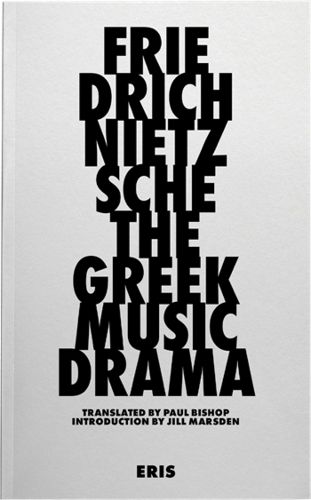Readings Newsletter
Become a Readings Member to make your shopping experience even easier.
Sign in or sign up for free!
You’re not far away from qualifying for FREE standard shipping within Australia
You’ve qualified for FREE standard shipping within Australia
The cart is loading…






"The real obstacle to the development of modern art forms is erudition, conscious knowledge, and an excess of knowledge: all growth and development in the realm of art has to take place in the dead of night."
The Greek Music Drama marks a significant moment in the development of Nietzsche's thought. Delivered as a lecture in 1870, it was the first public articulation of the major themes of his later, philosophical work: the importance of aesthetic experience for culture, the primacy of the body and physiological drives, and the centrality of music to Greek tragedy. Nietzsche here repudiates abstract scholarly approaches to the art of classical antiquity, proposing instead that that art demands of us the cultivation of distinctive emotional and intellectual capacities.
While The Greek Music Drama was written on the brink of the insights that inform The Birth of Tragedy, it stands as a fascinating document in its own right. Paul Bishop's preface and informative critical notes and Jill Marsden's illuminating introduction serve to redress the comparative neglect that this seminal text-presented here in an elegant bilingual format-has suffered in Nietzsche studies. They also set in its original context a work that will prove essential to anyone interested in theater, performance, and the art of tragedy.
$9.00 standard shipping within Australia
FREE standard shipping within Australia for orders over $100.00
Express & International shipping calculated at checkout
"The real obstacle to the development of modern art forms is erudition, conscious knowledge, and an excess of knowledge: all growth and development in the realm of art has to take place in the dead of night."
The Greek Music Drama marks a significant moment in the development of Nietzsche's thought. Delivered as a lecture in 1870, it was the first public articulation of the major themes of his later, philosophical work: the importance of aesthetic experience for culture, the primacy of the body and physiological drives, and the centrality of music to Greek tragedy. Nietzsche here repudiates abstract scholarly approaches to the art of classical antiquity, proposing instead that that art demands of us the cultivation of distinctive emotional and intellectual capacities.
While The Greek Music Drama was written on the brink of the insights that inform The Birth of Tragedy, it stands as a fascinating document in its own right. Paul Bishop's preface and informative critical notes and Jill Marsden's illuminating introduction serve to redress the comparative neglect that this seminal text-presented here in an elegant bilingual format-has suffered in Nietzsche studies. They also set in its original context a work that will prove essential to anyone interested in theater, performance, and the art of tragedy.